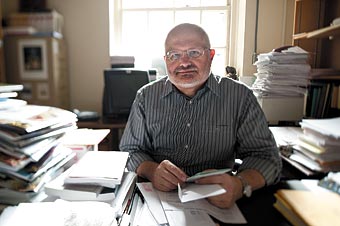Reason or faith? Darwin expert reflects
This is going to be a big year for evolutionary biologist Charles Darwin: 2009 marks the 150th anniversary of the publication of his book “On the Origin of Species,” and Feb. 12 would be his 200th birthday. Throughout the year, Darwin Day events are planned around the world to celebrate the man and his work, and to explore Darwin’s legacy of science and reason. (Read about events planned at UW–Madison.)

Ronald Numbers, Hilldale Professor of the History of Science and Medicine in the departments of Medical History and Bioethics and the History of Science, is one of the world’s leading authorities on the responses to evolutionary biologist Charles Darwin’s theory of evolution versus creationism.
Photo: Jeff Miller
On the top of many Darwin Day speakers lists is Ronald Numbers, Hilldale Professor of the History of Science and Medicine in UW–Madison’s departments of Medical History and Bioethics and the History of Science, two of the nation’s oldest such departments. Numbers is one of the world’s leading authorities on the responses to Darwin and he has been invited to speak at Darwin anniversary events the world over, including the Vatican in March.
Just a few of the publications to his credit include “Darwinism Comes to America,” “The Creationists,” “Science and Christianity in Pulpit and Pew,” and “Galileo Goes to Jail, and Other Myths About Science and Religion.”
His professional accolades include being named a Guggenheim Foundation Fellow, a fellow of the American Academy of Arts and Sciences, and a fellow of the American Association for the Advancement of Science, to name a few.
Numbers’ most recent tribute came from the History of Science Society, which honored him with the Sarton Medal, given to an outstanding historian of science selected from the international community in honor of lifetime scholarly achievement. “Receiving the Sarton Medal was an honor, but it didn’t earn me any extra respect from my colleagues here,” laughs Numbers.
Numbers sees the world through the eyes of a scientist but can appreciate the power and pull of the religious arguments for denying evolution, without dismissing the believers as ignorant or stupid.
Numbers is perhaps the unlikeliest of people to have become an expert on illuminating the interaction of scientific reason and religion. The son of a Seventh-day Adventist minister, he was educated in Adventist schools and grew up firmly believing in creationism and his church’s literal reading of the Bible: that God created the world 6,000 years ago and that the fossil record can be explained by the one year of Noah’s flood.
Then, while a graduate student at the University of California, Berkeley, he attended a lecture on the fossil forests of Yellowstone National Park. What he heard that evening sparked a crisis of faith that shook the foundation of his understanding of the world and his place in it. “That was the crack in the dam. I accepted that night the possibility that life had been on earth for 30,000 years,” says Numbers. “Once I decided to accept scientific evidence against inspired claims, there was no stopping. I kind of knew it that night. I started questioning everything.”
His loss of faith caused enormous pain and shame to his family – some of the old relationships and friendships are still strained. But perhaps it is his background that perfectly prepared Numbers to become a scholar on the history of science and religion. He sees the world through the eyes of a scientist but can appreciate the power and pull of the religious arguments for denying evolution, without dismissing the believers as ignorant or stupid.
Numbers is also respected by both evolutionists and creationists – he’s even been asked to collaborate with some young Adventist historians on a book for a conference this October. “Some of my friends think I’m totally nuts to do something like this. But I don’t much care about the personal beliefs of the historians as long as they are willing to confront the evidence in a naturalistic way. No miracles,” says Numbers.
As for Darwin, Numbers says Darwin was not the first person to write on evolution. An anonymous book, “Vestiges of the Natural History of Creation,” was published in 1844. Among other things, Darwin’s “On the Origin of Species” recounted the scientific observations he made during his five-year voyage on the HMS Beagle to South America and the Pacific.
Numbers also says Darwin’s ideas are often misunderstood and get muddled with furious debates on human evolution (there was only one sentence in the book on that subject), creationism and intelligent design.
Numbers spoke with Wisconsin Week to shed some light on Darwin and the confusing and conflicting beliefs of antievolutionists.
Wisconsin Week: At the time of its publication in 1859, was “On the Origin of Species” controversial?
Numbers: “Vestiges of the Natural History of Creation” was much more sensational and it sold better than Darwin. … Geologists had found lots of evidence of different inhabitants, fossils and animals of the past, but they stayed away from humans. It wasn’t until the late 1850s that fairly conclusive evidence of human antiquity appeared. That really shook things up. And then Darwin argued that there’s no such thing as a fixed species. Darwin, though, still allowed for the possibility of a creator … and showed how, by natural law, God could have populated the Earth by means of evolution. This took the sting out of things so it wasn’t a choice between God and science.
WW: What don’t we understand about Darwinism?
RN: One of the facts about Darwinism that is not well known is that the one part of Darwin’s theory that was least accepted by fellow biologists was the theory of natural selection. He said that his main goal in writing “On the Origin of Species” was to overthrow the dogma of separate creations, which later came to be known as creationism — that God did it. He wanted a natural explanation for the origin of species. He said he was partial to the theory of natural selection as the mechanism for producing species … but he wasn’t identifying natural selection as the heart of his theory.
Most people in the 19th century did not equate Darwinism with natural selection; Darwinism generally meant evolution. Within 15 years of the publication of “On the Origin of Species,” most biologists had become evolutionists. A consensus about natural selection didn’t develop until the 1930s and 1940s. Since then, there’s been a lot of reading back into the past, with many biologists insisting that true Darwinism is evolution based on natural selection.
WW: Can you explain why, after 150 years, there is still such resistance to evolution?
RN: For creationists, history is based on the Bible and the belief that God created the world 6,000-10,000 ago. … We humans were perfect because we were created in the image of God. And then there was the fall. Death appears and the whole account [in the Bible] becomes one of deterioration and degeneration. So we then have Jesus in the New Testament, who promises redemption. Evolution completely flips that. With evolution, you don’t start out with anything perfect, you start with primitive little wiggly things, which evolve into apes and, finally, humans. There’s no perfect state from which to fall. This makes the whole plan of salvation silly because there never was a fall. What you have then is a theory of progress from single-celled animals to humans and a very, very different take on history, and not just human history.
WW: What do Americans believe about creation and evolution?
RN: Since the early 1980s, the Gallup Poll has asked something along the lines whether respondents believed that the first humans were created no more than 10,000 years ago. Responses have varied from 43-48 percent [believing this]. In 2005 or 2006, there was a different question added that asked if they believed in or leaned toward creationism, and 65.5 percent said yes. That’s two-thirds of Americans! What we don’t know, because no pollster has asked, is how many of these are old-earth creationists [who believe the Earth is old but that humans didn’t appear until about 10,000 years ago]. It doesn’t tell us much about young-earth creationists [who believe that all life began about 10,000 years ago]. [The poll] does tell us about suspicion toward evolution, especially human evolution. Also, it doesn’t distinguish between creationism and intelligent design.
WW: What is intelligent design and where does it fit in?
RN: I suspect most people don’t understand what intelligent design is. I’ve talked to enough people who didn’t understand it to make me really suspicious, and there are even people who lecture about it and don’t know what they’re talking about. I don’t define it; what I do is let the advocates of intelligent design speak for themselves. The biggest object of criticism from the intelligent design camp is known as “methodological naturalism.”
The term “methodological naturalism” didn’t exist until the 1980s, but the movement, based on the idea that scientists should limit themselves to nonsupernatural explanations, existed before then. Thus, if you come to a tough spot, and you say “God did it and there was a miracle,” that’s not doing science. Under the rule of methodological naturalism, that’s cheating. That’s a science stopper right there. From roughly 1750-1850, in one scientific discipline after another, the scientific practitioners lined up with the notion that there would be no more miracles in what was coming to be called “science.” You could believe in miracles, but it wouldn’t count as science. You could, for example, still share your beliefs about the role of God in nature with your church group, but you couldn’t invoke God in, say, an article for the American Journal of Science and say, “And here’s where God stepped in.” This became a fundamental rule, and not just in science. Even historians adopted it and quit appealing to God or to Satan. Christians became avid practitioners of methodological naturalism because it didn’t require them to deny their faith.
Now, the founders of the intelligent design movement regarded this as a terrible position. They argued that if the goal of science was to discover truth about nature, why would scientists arbitrarily tie their hands before they started their investigations and say we refuse to mention God even if they find compelling evidence of God or an intelligent designer? Their goal was to re-sacralize science, to turn the clock back 150 years and re-allow the supernatural to count as science.
It so happened that the area where they launched their biggest attack was evolution, but, of course, it wouldn’t be limited to evolution. [Evolution is where] they think they have the best evidence for irreducible complexity, where you allegedly need God in order to explain things. Intelligent designers have a huge reservoir of support, in part because people don’t realize what they’re up to. Close to 90 percent of Americans are theists, who believe that there is a God, and that if there is a God, that God does something. So these people are not generally averse to the notion that God had been involved in creating and running the universe. But when I ask purported partisans whether they mind if science puts in a miracle here or God and Satan there, they say “Oh, that’s crazy.”
They tend to think intelligent design is benign in the sense of it simply being more open to God. They don’t see it as changing the one most fundamental rule for doing science, which has worked very well for 150-200 years, and to go back to the old days when you could talk about God as part of natural philosophy.
Thus, most people don’t really understand intelligent design. Besides, many admirers and critics mistakenly conflate it with young-earth creationism, and others embrace it as just another critique of materialistic evolution.
Michael Behe [a leading advocate of intelligent design] claims that this discovery [of irreducible complexity, which argues that some biological systems are too complex to have evolved from a simpler form] should rank in the history of science up there with the discoveries of Newton and Lavoisier and Einstein. If he did find evidence of God, that would be huge, and I would put it up there. However, no one but Michael Behe and his buddies thinks he has discovered evidence of God. I guess we’ll have to wait and see.
WW: So antievolutionists quarrel with evolution for different reasons?
RN: In this context, you have two types of evolution, theistic and nontheistic, and the boundary is very fuzzy. I joke with a friend of mine who writes on theistic evolution, asking him: “How many supernatural interventions does it take to make a creationist?” In the late 19th century, at least one prominent antievolutionist thought that the answer was only three supernatural interventions: for the creation of matter, life and humans. But many self-identified theistic evolutionists thought many more than that. So you can’t even tell by the number of supernatural interventions who believed what.
Until well into the 20th century, most critics of evolution were known simply as antievolutionists. The term “creationism” wasn’t widely used until the end of the 1920s, because the people who opposed evolution couldn’t agree on anything. They were all Bible believers, but they had different interpretations of the Bible. Many of the fundamentalists in the 1920s, at the time of the Scopes trial, believed in the antiquity of life on Earth, that there had been millions of years of plants and animals and that the Garden of Eden occurred 6,000-10,000 years ago. Most fundamentalists who left a record of their opinions accepted the fact of the antiquity of life.
The movie “Inherit the Wind” is a complete skewering of history. William Jennings Bryan always believed that the days of Genesis represented vast geological ages. At the Scopes trial, he testified that antievolutionists didn’t care whether creation had taken six days or 600 million years. Age wasn’t the issue; the origin of humans was.
A much smaller group of antievolutionists explained the fossil record by attributing it to the one year of Noah’s flood. They were first known as flood geologists. Then, in about 1970, they renamed themselves scientific creationists or young-earth creationists — they’re all the same people.
WW: How is all this regarded by nontheistic scientists? What’s all the hubbub about?
RN: To a certain extent, the controversy has been invented by science writers, to whom I would give very bad grades. Even reputable magazines such as TIME and Newsweek write about how intelligent design is splitting the science community. Over the years, the intelligent design people have kept a list of scientists willing to sign a statement in dissent from evolution – they’ve gotten about 700 or so to sign it. Is that high or low? You can’t get a good figure on how many scientists there are in the world. But I’ve found a pretty reliable approximation that there are 3-10 million from the president of the International Council of Scientific Unions. From that, I took the lowest possible number, 3 million, and divided it by 700, which gives the intelligent designers less than 0.023 percent of the world’s scientists. It’s a miniscule percentage.
It’s funny, I’d get calls from journalists during the Dover trial [2005 trial in Pennsylvania that challenged a school district’s requirement to present intelligent design as an alternative to evolution] and they’d ask if this was the end of young-earth creationism. No, no, no! It just means that this is the exciting event right now. And sure enough, a year and a half later, the creation museum opens [in Kentucky] and everyone says, “That’s where the action is now. Was intelligent design beaten in Dover and has it now gone away?” No, they’re both flourishing. It’s just that the press has to have a court trial or a political battle or something weird, like a $27 million museum, to attract its attention. You can’t tell anything about the issues by news coverage.
There’s also this understandable, but hair-brained notion, that coverage should be balanced. Well, I guess that we should give the flat-earthers balanced treatment, too. Do we give holocaust deniers balanced treatment when it comes to talking about 20th century history? Do we give astrology or alchemy equal time? That’s the defense many journalists seem to use.
I congratulate my friends in the intelligent design movement. They’ve convinced a large number of people there’s a controversy. But the controversy is largely in their own minds and in the news coverage. And then they try to convince school boards to teach this bogus scientific controversy.
WW: How do we teach evolution?
RN: It varies greatly from place to place. Polls show that in some states a substantial percentage of biology teachers don’t believe in evolution. So they’re not going to be good at teaching evolution. In many places it’s so controversial, some teachers just ignore it. It’s taught well in some places, but overall, it’s not a great achievement of American high school or collegiate education.
Tags: history



